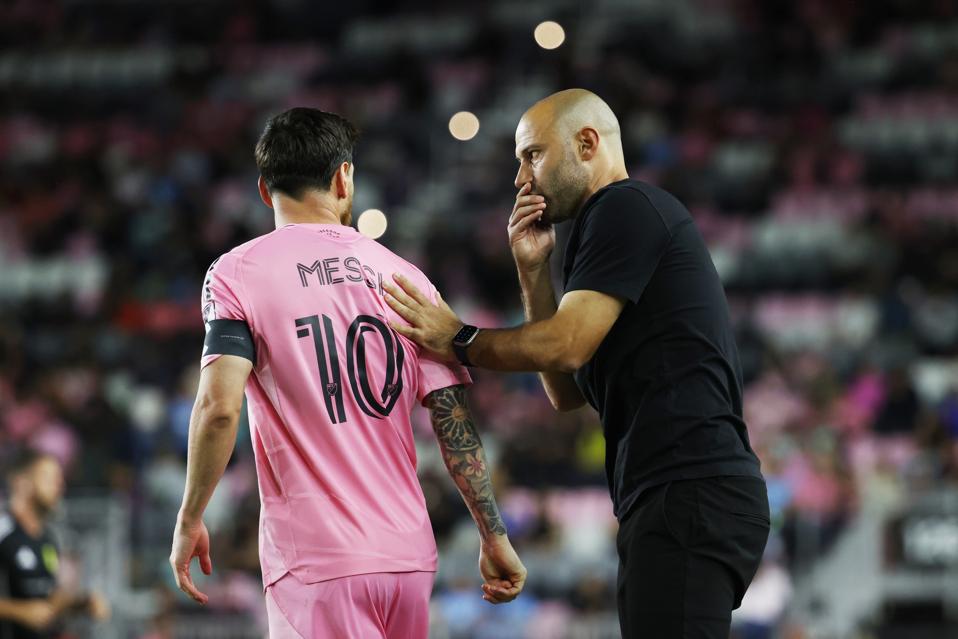Lionel Messi’s first full season in Major League Soccer in 2024 ended with his Inter Miami team topping the overall league table with a record points tally and their star man walking away with the league’s MVP award. One of these achievements will repeat in 2025, as Messi has once again, perhaps predictably, been the outstanding player in MLS.
Having been named MVP in 2024, and deservedly so despite not playing as many minutes as the other contenders, Messi is in line to become the first player to win the award in consecutive seasons.
The first season of MLS kicked off in 1996 on the back of the 1994 World Cup held in the United States. The only player to be named MVP twice in the league’s 30-season history is Preki, who won it in two separate stints with the Kansas City Wizards.
Messi will more than likely become the second in early November, late December this year, ahead of the MLS Cup final when the award is usually announced.
His Inter Miami team will hope to be in that final, as for all the individual plaudits bestowed on Messi, the main trophy they have been targeting during his time at the club is the MLS Cup.
Miami Performance
Messi now has another three years to attempt to win further silverware for Miami, after signing a new contract last week.
The team’s achievements consist of a Leagues Cup in 2023 and the Supporters’ Shield in 2024, which is disappointing considering the star players the club has been able to acquire.
It failed to retain the Shield in 2025 and couldn’t claim any of the other realistic trophies on offer this year. Everything now rests on the MLS Cup, and there is pressure on head coach Javier Mascherano to guide his team to playoff success.
In 2025, Inter Miami has been playing catch-up for much of the year due to participation in those other competitions, including the Concacaf Champions Cup and Leagues Cup, but most notably, the Club World Cup, where it went further than MLS teams were expected to by progressing from its group, thanks to a memorable win against Porto.
That Porto victory was inspired by a match-winning Messi free-kick, and though Inter Miami was knocked out by Paris Saint-Germain in the first knockout round, its progress was considered an achievement for the league.
Other competitions don’t count towards MLS awards, including the MVP, but they invariably play a part in how a player is viewed.
Individual awards can be a popularity contest as much as they are merit-based, but Messi has the numbers as well as the hype.
Though Inter Miami as a team could not use its games in hand to claw back the points required to overtake Philadelphia Union at the top of the overall MLS standings, Messi’s performances still stood out.
It was a familiar story for much of the season. An exhilarating attack, led by Messi, but a failing defense and poor team structure off the ball.
In the Eastern Conference, Miami’s defensive record was worse than New York Red Bulls, Toronto FC, and New England Revolution, all of whom were considered to have had disappointing seasons and failed to make the playoffs, but Miami’s attacking record was the best in the entire league by some distance.
The 81 goals scored were 13 better than the next highest scorers, Chicago Fire, and 24 goals more than table-topping Philadelphia.
Messi Stats
Messi scored 29 of Miami’s 81 goals, which was enough to see him claim the MLS Golden Boot, five goals ahead of nearest challengers Denis Bouanga of Los Angeles FC and Nashville’s Sam Surridge.
The assists tally can get a bit more complicated due to MLS counting them differently from the rest of the soccer world, as it includes some secondary assists in its totals.
According to MLS’s own data, Messi’s 29 goals were complemented by 19 assists. This combined total of 48 goal contributions (goals plus assists) was one off the league record set by Carlos Vela in 2019, whose remarkable 34 goals plus 15 assists put him on 49 contributions.
Using the normal definition of assists used throughout the rest of the soccer world, Messi had 16 in 2025, putting him on 45 goal contributions, while Vela had 10 in 2019, putting him one behind Messi on 44.
Whichever way Messi’s goals plus assists record is viewed, it is impressive. Vela won around 70% of the vote for the 2019 MVP, and it would be a surprise if Messi’s MVP vote isn’t more than that in 2025.
Some other players, including Bouanga, Evander of FC Cincinnati, and Anders Dreyer of impressive newcomers San Diego FC, have had very good seasons that, in other, non-Messi years, would have had them in the running, but as it is, there is only one realistic choice for the award in 2025.
Messi remains one of the best players in the world. MLS isn’t considered high enough quality for him to be in the conversation for the Ballon d’Or, but his performances should at least have him on the shortlist.
Within MLS itself, however, there is no doubt who the best player is, and the most valuable.

